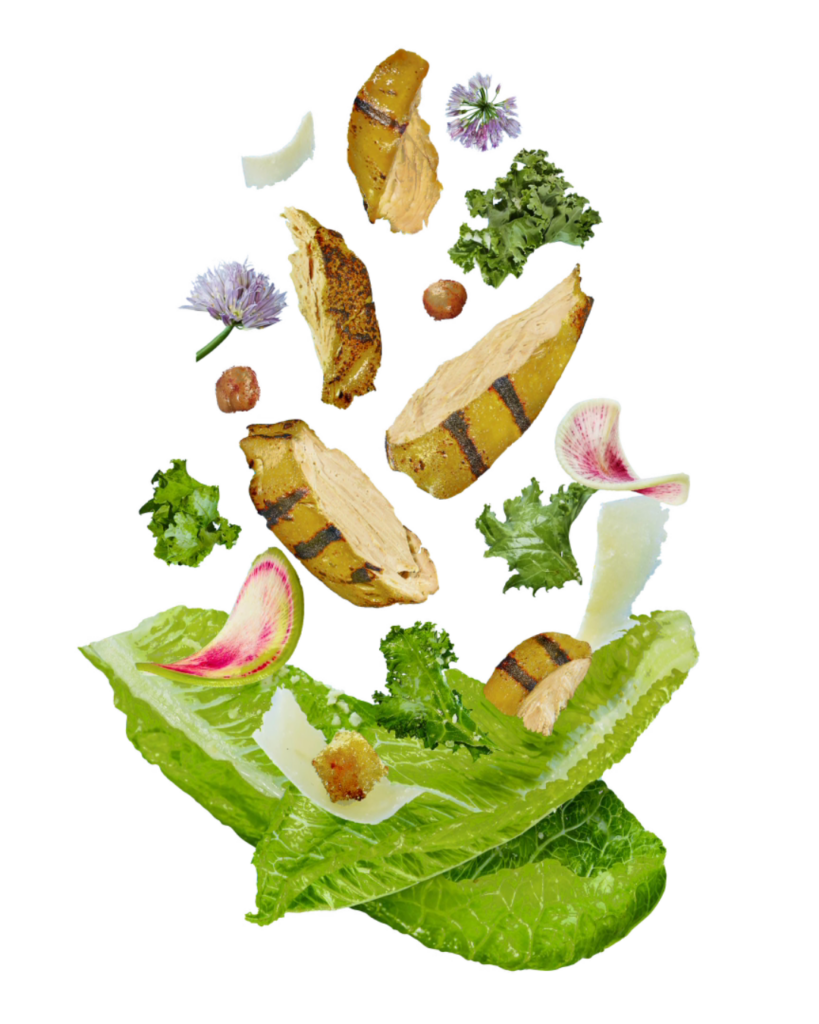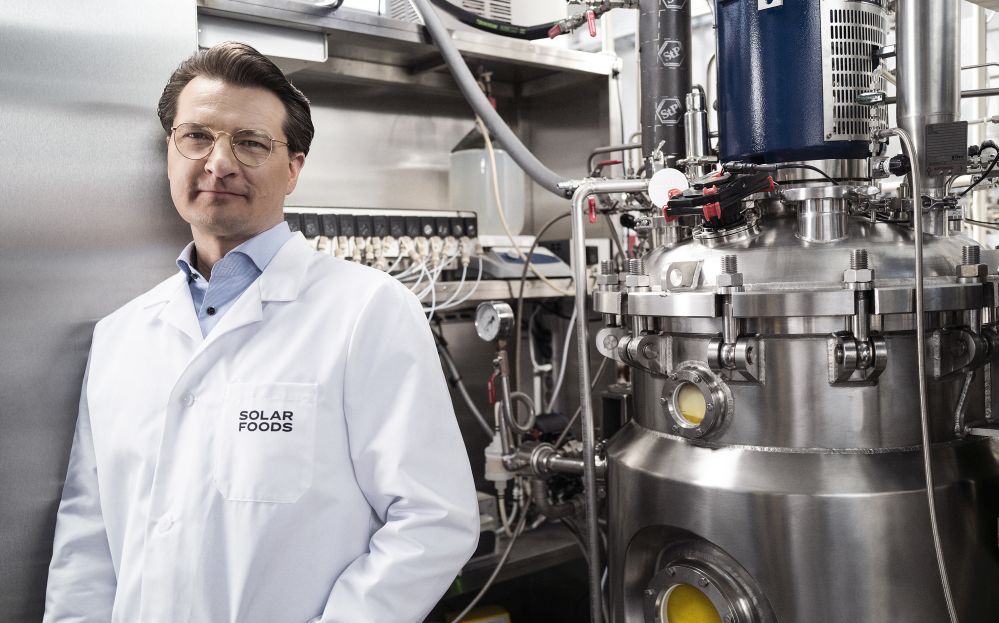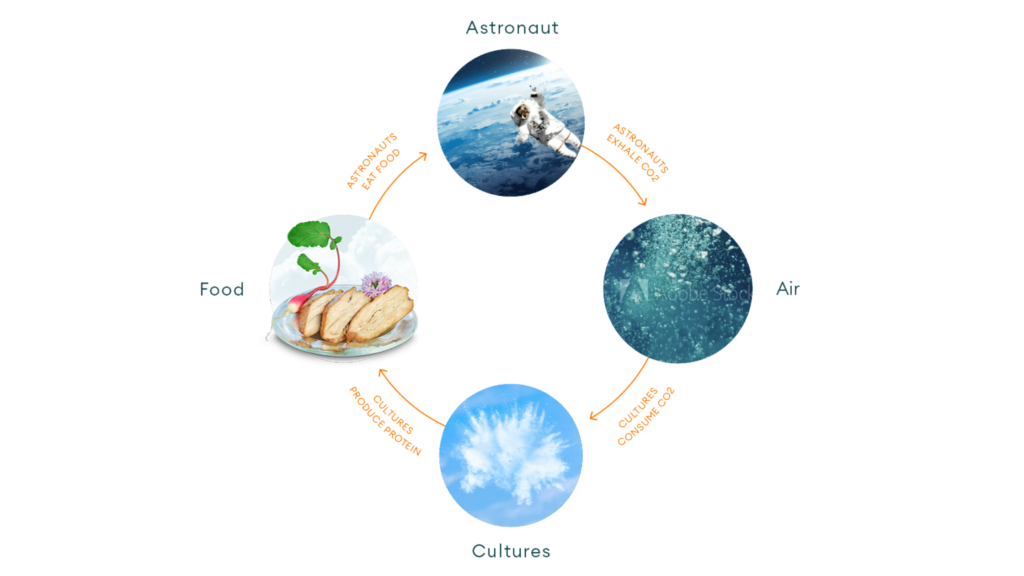Landless Agriculture Is The Latest In Alternative Protein Production, Which ‘grows’ Protein From Sustainable Sources, Rather Than Produce
Innovative approaches are reshaping the future of food. From insect farming to air-based technologies, here is a look into the global landscape of sustainable protein solutions, that aim for a resilient approach to nourishing our growing population without exhausting the earth’s resources.
12 March 2024
Share this exclusive content from Saladplate

Scallops made by Air Protein. Image credit: Air Protein
Innovation often emerges from necessity, and in the realm of agriculture, the concept of landless farming stands as a testament to human ingenuity in addressing pressing challenges. Landless agriculture represents a paradigm shift in how we grow crops and rear livestock. Unlike traditional methods reliant on vast expanses of arable land, landless farming harnesses technology to cultivate crops and farm animals in controlled indoor environments — often without soil and sun.
Solutions such as air protein technology are gaining substantial traction to meet the growing demand for traditional meat and seafood. This surge, driven by rapid economic growth, has led to a noticeable shift in consumer preferences towards alternate and diverse protein sources.
California startup Air Protein endeavours to separate protein production from land use. Leveraging NASA research from the 1960s, Air Protein has created a fermentation system utilizing a unique microbe strain that consumes carbon dioxide, rather than sugar, to cultivate microbial proteins. With a total of over $107 million raised in funding, Air Protein has secured investments from prominent entities such the Ford Foundation, Barclays Sustainable Impact Capital, and more.
The global air-based foods market is projected to surge at an 11.7% CAGR, reaching US$ 100 million by 2032, driven by the rising demand for sustainable proteins. According to the report, air-based foods will initially gain traction in North America and Europe, responding to the increasing preference for eco-friendly food solutions. This technology, originally developed for space missions, offers a promising alternative to traditional agriculture, addressing issues like the scarcity of land, species extinction, soil erosion, and pollution.

Protein grown with air, water and energy. Image credit: Air Protien
A study conducted by Singapore Management University reveals a greater acceptance of protein alternatives among Singaporean consumers alone, compared to their American counterparts. This highlights a cultural openness to embracing sustainable and diverse protein sources, aligning seamlessly with Asia’s flourishing alternative protein industry, creating an environment conducive to innovative solutions.

Solein® protein used in a dish. Image credit: Solar Foods
“In Asia, the alternative protein industry is young but thriving, offering ample opportunities for innovation. Singapore is encouraging investments in the agri-food sector to support research and development in this area, enhancing food security,” shares Winnie Chia, a Nutritionist and Lecturer at Republic Polytechnic’s Diploma in Health Management and Promotion.
As the alternative protein industry in Asia gains momentum, statistics further affirm this trajectory. Allianz Trade reports that global investments in the agritech startups reached a record high of US$22.3 billion in 2021. It also projected the global agrifood market to reach US$9.73 trillion in 2023 and about US$12 trillion by 2027, underlining a commitment to fostering innovation and securing a more sustainable future for food production.

Altimate Protein Bar made from crickets | Image credit: Altimate Nutrition
Contributing to this narrative are initiatives like Altimate Nutrition, driven by Singapore’s Republic Polytechnic students. By converting insects into a viable human food source, these students address critical social issues such as food insecurity and climate change. A report by International Journal of Environmental Research and Public Health highlights the efficiency of insect farming, with a 90% reduction in greenhouse gas emissions compared to traditional livestock farming. Additionally, insect farming requires significantly less land and water resources, making it a statistically viable solution for sustainable protein production.
The discussion extends to Air Protein, founded in 2019 by Dr. Lisa Dyson. Designed with the same building blocks that all plant life needs to grow – air, water, and renewable energy – Air Protein’s production process consumes 95% less water and 90% less land compared to traditional meat production. They claim they are ‘defining the future of wholesome food production through landless agriculture’.
Solein®, produced by Solar Foods, is a natural protein created through a fermentation process using air and electricity. This eliminates the need for traditional farming or fossil fuels, presenting a statistically viable solution for sustainable protein production.

Fazer Taste the Future snack bar. Image credit: Solein®
In January 2024, Solar Foods collaborated with Fazer to introduce a limited-edition snack bar powered by Solein®️ in selected Cocoa Tree stores across Singapore. The Fazer Taste the Future snack bar, a vegan-friendly, palm oil-free option made of 70% dark chocolate, hazelnut, dried strawberries, and crunchy oat puffs, aligns perfectly with Solar Foods’ momentum.

Pasi Vainikka, CEO and Co-founder of Solar Foods. Image credit: Solar Foods
This partnership with Fazer aligns perfectly with the momentum of Solar Foods, as emphasised by Pasi Vainikka, co-founder and CEO of Solar Foods. “This is an exciting moment for us working with Fazer – the very first-time people can try Solein® within a consumer snack bar. This demonstrates the potential of Solein also as a sustainable and nutritious fortifier. With this introduction in Singapore, we are getting valuable customer feedback on Solein’s viability in a new product category and also getting a sense of the consumer acceptance of future ingredients. Our shared aim extends beyond this pivotal moment, targeting a wider-scale European launch in 2025-2026 with a whole range of products

From Moonshot to Meat. Image credit: Air Protein
“The potential of alternative proteins is vast, offering greater nutrition, diversity, lower carbon emissions, and scalable production. It presents a viable long-term solution to address the challenges of food insecurity and is poised to shape the future of food,” shares Chia. Landless agriculture and alternative proteins signify a pivotal shift towards sustainable agriculture to meet the challenges of a burgeoning global population. As the world approaches 9.8 billion people by 2050, the need for innovative food production methods has never been more urgent. Landless farming offers a solution to land scarcity and environmental degradation and addresses the increasing demand for sustainable protein sources. There is a clear path towards shaping a more equitable, sustainable, and nourishing world for generations to come.
Author: Victoria Lim
Victoria Lim is a content writer with a diverse background and her work includes brands such as Capella Hotels and Resorts, Epicure Magazine, HungryGoWhere.com, and Makansutra. Her luxury hospitality, culinary arts, and food journalism expertise have shaped her commitment to sharing stories.



